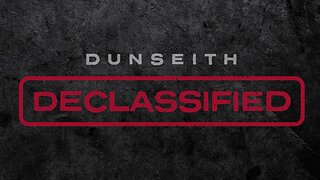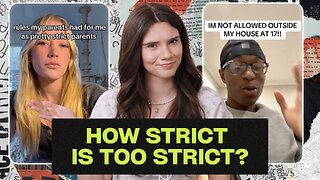Premium Only Content

The Dark Truth About "Palestine"
This video is made by Rabbi Dror Kassuto, from Emunah.com - Freedom Through Faith
The Israeli–Palestinian conflict is one of the world's most enduring conflicts, with the Israeli occupation of the West Bank and the Gaza Strip reaching 54 years of conflict. Various attempts have been made to resolve the conflict as part of the Israeli–Palestinian peace process.
Public declarations of claims to a Jewish homeland in Palestine, including the 1897 First Zionist Congress and the 1917 Balfour Declaration, created early tension in the region. At the time, the region had a small minority Jewish population, although this was growing via significant Jewish immigration. Following the implementation of the Mandate for Palestine, which included a binding obligation on the British government for the "establishment in Palestine of a national home for the Jewish people" the tension grew into sectarian conflict between Jews and Arabs. Attempts to solve the early conflict culminated in the 1947 United Nations Partition Plan for Palestine and the 1947–1949 Palestine war, marking the start of the wider Arab–Israeli conflict. The current Israeli-Palestinian status quo began following Israeli military occupation of the Palestinian territories in the 1967 Six-Day War.
Key issues that have stalled further progress are security, borders, water rights, control of Jerusalem, Israeli settlements, Palestinian freedom of movement, and Palestinian right of return. The violence of the conflict, in a region rich in sites of historic, cultural and religious interest worldwide, has been the subject of numerous international conferences dealing with historic rights, security issues and human rights, and has been a factor hampering tourism in and general access to areas that are hotly contested. Many attempts have been made to broker a two-state solution, involving the creation of an independent Palestinian state alongside the State of Israel (after Israel's establishment in 1948). In 2007, the majority of both Israelis and Palestinians, according to a number of polls, preferred the two-state solution over any other solution as a means of resolving the conflict.
Within Israeli and Palestinian society, the conflict generates a wide variety of views and opinions. This highlights the deep divisions which exist not only between Israelis and Palestinians, but also within each society. A hallmark of the conflict has been the level of violence witnessed for virtually its entire duration. Fighting has been conducted by regular armies, paramilitary groups, terror cells, and individuals. Casualties have not been restricted to the military, with a large number of civilian fatalities on both sides. There are prominent international actors involved in the conflict. A majority of Jews see the Palestinians' demand for an independent state as just, and think Israel can agree to the establishment of such a state. The majority of Palestinians and Israelis in the West Bank and Gaza Strip have expressed a preference for a two-state solution. Mutual distrust and significant disagreements are deep over basic issues, as is the reciprocal skepticism about the other side's commitment to upholding obligations in an eventual agreement.
The two parties currently engaged in direct negotiation are the Israeli government, led by Naftali Bennett, and the Palestine Liberation Organization (PLO), headed by Mahmoud Abbas. The official negotiations are mediated by an international contingent known as the Quartet on the Middle East (the Quartet) represented by a special envoy, that consists of the United States, Russia, the European Union, and the United Nations. The Arab League is another important actor, which has proposed an alternative peace plan. Egypt, a founding member of the Arab League, has historically been a key participant. Jordan, having relinquished its claim to the West Bank in 1988 and holding a special role in the Muslim Holy shrines in Jerusalem, has also been a key participant.
Since 2006, the Palestinian side has been fractured by conflict between two major factions: Fatah, the traditionally dominant party, and it's later electoral challenger, Hamas, which also operates as a militant organization. After Hamas's electoral victory in 2006, the Quartet conditioned future foreign assistance to the Palestinian National Authority (PA) on the future government's commitment to non-violence, recognition of the State of Israel, and acceptance of previous agreements. Hamas rejected these demands, which resulted in the Quartet's suspension of its foreign assistance program, and the imposition of economic sanctions by the Israelis.
-
 28:37
28:37
Ohio State Football and Recruiting at Buckeye Huddle
11 hours agoBold Predictions for the 2025 Ohio State Spring Game
15.1K3 -
 21:25
21:25
JasminLaine
13 hours agoMark Carney Gets Visibly ANGRY at Reporter—Poilievre BURIES Him! Then He Goes Into HIDING
8.36K12 -
 16:56
16:56
Clownfish TV
1 day agoDisney's DEATH by Tariffs? They DEPEND on China!
15.2K8 -
 11:30
11:30
IsaacButterfield
1 day ago $0.74 earnedThis Hate Speech Law Is RACIST To White People.
10.5K15 -
 14:57
14:57
BEK TV
1 day agoEP 6 - DUNSEITH DECLASSIFIED: RESPECTED NATIONAL MEDIA LEGAL EXPERT WEIGHS IN
17.3K -
 29:59
29:59
The Brett Cooper Show
3 days ago $15.32 earnedHow This Sparked A MASSIVE Parenting Debate Online | Episode 20
57.7K89 -
 17:55
17:55
DeVory Darkins
18 hours ago $22.55 earnedCNN crushed by pronouns as Trump scores HUGE VICTORY
83.9K77 -
 2:48:33
2:48:33
Barry Cunningham
18 hours agoWATCH LIVE: MY INTERVIEW WITH LARA TRUMP! AND TODAY'S NEWS ABOUT DEMOCRATS HATING AMERICA!
122K28 -
 3:12:15
3:12:15
TimcastIRL
12 hours agoLiberals BLAME TRUMP For NYC Tourist Helicopter Crash After Tragic Accident | Timcast IRL
284K186 -
 1:16:36
1:16:36
Glenn Greenwald
14 hours agoGlenn Takes Your Questions: On Banning Candidates in the Democratic World, Expanding Executive Power, and Trump's Tariffs | SYSTEM UPDATE #437
141K52